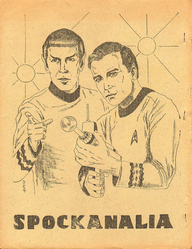|
by Emily Langford  Photo by Sincerely Media on Unsplash Photo by Sincerely Media on Unsplash As a queer, “elder millennial” who watched as personal computers suddenly took root in our homes, I experienced the rise of online fandom firsthand. Prior to the internet, my experience with fandom was a solo one, I didn’t know anyone who had the same obsessive passion for stories and characters like I had. I was the annoying kid who would, unprompted, spew out tidbits and theories about books and movies, the weirdo who was off in her own little world where all her characters existed at my day-dreamy little whims. I was tolerated at best and I eventually learned to keep my fervor to myself. I remember the first time I entered the titles of my favorite obsessions into the search bar. Suddenly, I was very much not alone. Each of my hyperfixations had a dedicated chat room or message board with other people who understood, who shared my passions. I finally found a place of acceptance.
1 Comment
by Cat Reed
Those were the roots that the newly created stories ventured forth from, but it would seem that instead of embracing that part of the history, authors would rather avoid the fanfiction they used to write as one would avoid a dog in desperate need of a bath.
by Lesley George  Photo by Shelby Miller on Unsplash Photo by Shelby Miller on Unsplash I’ll admit—I have spent hours skimming through fanfiction, picking the perfect tag to fit into the hyper-specific story I wanted to read: friends to lovers, fluff, slice of life, alternate universe (AU). There is something euphoric about being able to find a story so acutely tailored to my tastes; the only thing that could ruin the experience for me would be a misuse of a story tag [“Please use story tags correctly!” I cried]. Tropes and tags are a staple within the fandom realm and exist to satisfy the fans desire for curated content, made by other fans, involving their favorite characters. But can these markers exist outside fandom culture?  by Amanda Smera Few things make me angrier than when people read something I’ve written and point out my talent. The intentions, of course, always come from a good place and they mean no harm. And yet the bitter taste in my mouth never fails to feel discrediting. I want to scream from the top of my lungs: “I’VE BEEN WORKING ON THIS FOR A MONTH STRAIGHT, FOR YOU TO DARE AND ASSUME IT WAS JUST ‘MY TALENT’?!” It feels like an outdated myth that talent is a bigger force, that either you’ve got it, or you don’t. I have hundreds of thousands of school essays, Harry Potter fan fictions, and journal entries that prove that I was no Jane Austen at the age of five or fifteen.  image via amazingstoriesmag.com image via amazingstoriesmag.com By Mikaela Langdon Before the internet, fans of books, movies, and television shows had to keep their opinions and ideas about characters and storylines largely to themselves. At most, they might have shared them with friends or relatives. Now we’re in an age where people can share ideas at the push of a button. This has opened up the doors for something known as “fanfiction”: original stories with characters, settings, and sometimes other characteristics borrowed from popular culture. This concept originated, surprisingly, prior to the internet age in Star Trek fanzines such as Spockanalia (1967). This zine contained fanfiction written about the popular science-fiction show and was mailed to super-fans for their enjoyment. With the invention and advancement of the internet, fanfiction has practically become its own industry, allowing fans to become co-creators with the writers they so admire. These works are not intended for publication, at least not in their initial format, and give full credit to the original authors or creators. Fanfiction is not meant to overshadow the original content but rather to celebrate it. But what happens when a fanfiction author takes characters we all know and love and makes them her own, complete with a new backstory and personality? At what point does fanfiction go far enough from the source and just become regular fiction? |
Archives
July 2024
Categories
All
|
|
Glassworks is a publication of Rowan University's Master of Arts in Writing 260 Victoria Street • Glassboro, New Jersey 08028 [email protected] |
All Content on this Site (c) 2024 Glassworks
|


 RSS Feed
RSS Feed
